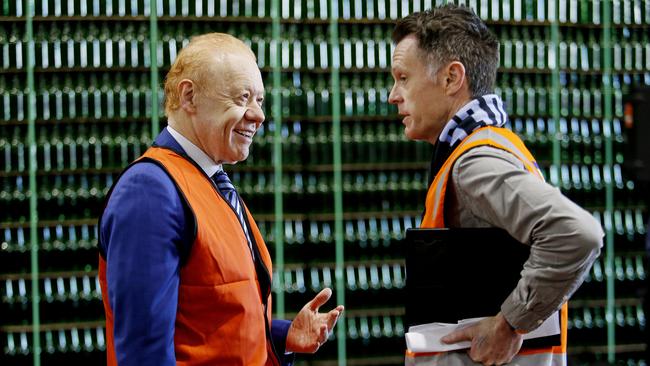Gina Rinehart’s Hancock Prospecting tops IBISWorld’s private companies list
Gina Rinehart’s Hancock Prospecting has retained the top spot as Australia’s largest private company in IBISWorld’s Top 500 | SEE THE LIST

Gina Rinehart’s Hancock Prospecting has retained the top spot as Australia’s largest private company, while Anthony Pratt’s Visy Industries managed to hold on to second place in a more subdued year for revenue growth among the nation’s unlisted businesses.
But gold and precious metals group Pallion bucked the trend, climbing to third place following a 37 per cent surge in revenue that knocked United Petroleum out of the top three.
IBISWorld’s Top 500 list of private companies found total revenue for Australia’s largest 500 unlisted businesses grew over the 2024 financial year, but at a much slower rate than the prior year.
It estimates total revenue for private companies, partnerships, co-operatives, associations and non-listed public companies hit $359.9bn in 2023-24, a 7 per cent lift on the prior year. But this was well below the 20.3 per cent revenue surge recorded in fiscal 2023.
Average revenue by company increased to an estimated $719.7m, up from $672.6m in 2022-23’s Top 500 list. But more companies recorded revenue growth through the year, with 86.6 per cent recording higher revenue, up from 75 per cent the year prior.
The average lift in revenue for a company in the list was 7.6 per cent, down from 10.7 per cent in 2023.
The growth came amid a challenging year for business marked by persistently sticky inflation and higher rates.
Hancock Prospecting held its position as Australia’s best-performing private enterprise with an estimated revenue of $14.9bn in the 2024 financial year, a 3.9 per cent rise on the previous 12 months.

This was followed by the Pratt family’s pulp, paper and paperboard manufacturing business, Visy, with estimated revenue of $9.9bn, up 3.4 per cent.
Hancock Prospecting boosted its revenue in the year, even as iron ore prices came under pressure. The iron ore price reached a peak of $US142 a tonne in January before beginning a descent that saw it drop under $US100 a tonne in August. Prices are set to remain under pressure amid weaker demand from China.
Hancock chairman Mrs Rinehart, Australia’s richest person, noted the pressure on iron ore prices when speaking at The Australian’s Bush Summit in Port Hedland on Friday, as she warned the Albanese government’s industrial relations and environment policies risked alienating Australia’s largest iron ore producers.
“Only 20 per cent of the pipeline of major resources projects now get through the increased government tape to deliver development and consequent high-paying jobs and more,” Mrs Rinehart said. “This is reality. And the consequences should be obvious.”
The mining mogul, whose private Roy Hill iron ore complex competes with Rio and BHP, said her rivals were increasingly looking offshore rather than prioritising Australian investment.
It was a bumper year for NSW-headquartered Pallion on the back of strong gold and silver prices.

Pallion designs, manufactures, and distributes precious metal products and related services, including for products such as jewellery and dental implants. It operates a suite of companies in the precious metals sector, including ABC Bullion, ABC Refinery and WJ Sanders, with its history dating back to the 1950s.A near-40 per cent surge through the year took Pallion’s revenue to an estimated $9.4bn, just shy of Visy’s $9.9bn.
“Gold and silver are seen as stores of value and prices generally increase amid the sort of economic conditions we’re seeing globally, including fears of recession and high inflation,” said IBISWorld analyst Andrew Ledovskikh.
Gold prices surged through fiscal 2024, from under $US2000 an ounce to $US2500 an ounce, as US rate cuts edge closer.
Traditionally, declining US rates and a declining US dollar have been good news for gold.
Elsewhere on the list, United Petroleum, founded by Avi Silver and Eddie Hirsch, dropped to fourth place, with revenue rising an estimated 9.5 per cent to $7.6bn. This was followed by WA grain storage company CBH, owned by about 3500 WA grain-growing businesses, which came in fifth following a 3.6 per cent decline in revenue to an estimated $6bn.
The big downward move in the top unlisted companies was billionaire property developer Harry Triguboff’s Meriton, which tumbled from 11th to 23rd place following a 12 per cent revenue decline, in a year that saw the construction industry come under relentless pressure.

Higher rates, rising costs, and labour shortages all negatively affected a wide range of construction companies on the list.
“The sector as a whole saw almost 3000 companies enter insolvency in 2023–24 under pressure from these economic headwinds,” Mr Ledovskikh said.
The big four consultancies were also hit hard throughout the year: EY, Deloitte, PwC, and KPMG all reported revenue declines and fell down the rankings, as smaller consultancies BDO, Findex and Grant Thornton posted revenue growth.
“Worsening economic conditions have affected demand from the private sector for all firms, but smaller firms have benefited from a concerted effort by public sector clients to shift contracts to smaller consulting firms,” Mr Ledovskikh said.
IBISWorld bases its revenue estimates on company revenue data, employee figures and industry figures.





To join the conversation, please log in. Don't have an account? Register
Join the conversation, you are commenting as Logout